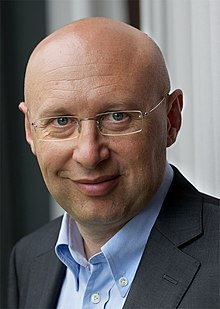Stefan Hell

Stefan W. Hell (born 23 December 1962) is a Romanian-born German physicist and one of the directors of the Max Planck Institute for Biophysical Chemistry in Göttingen, Germany.[1] He received a Nobel Prize in Chemistry in 2014 "for the development of super-resolved fluorescence microscopy", together with Eric Betzig and William Moerner.[2]

Life
Born into a Banat Swabian family in Sântana, Arad County, Romania,[3] he completed one year of high school at the Nikolaus Lenau High School in Timișoara before emigrating with his family to West Germany in 1978.[4]
Hell began his studies at the University of Heidelberg in 1981, where he received his doctorate in physics in 1990. His thesis advisor was the solid-state physicist Siegfried Hunklinger. The title of the thesis was “Imaging of transparent microstructures in a confocal microscope”.[5] He was an independent inventor for a short period thereafter working on improving depth (axial) resolution in confocal microscopy, which became later known as the 4Pi microscope. Resolution is the possibility to separate two similar objects in close proximity and is therefore the most important property of a microscope.
From 1991 to 1993 Hell worked at the European Molecular Biology Laboratory in Heidelberg,[6] where he succeeded in demonstrating the principles of 4-Pi microscopy. From 1993 to 1996 he worked as a group leader at the University of Turku (Finland) in the department for Medical Physics,[7] where he developed the principle for stimulated emission depletion STED microscopy.[8] From 1993 to 1994 Hell was also for 6 months a visiting scientist at the University of Oxford (England).[7] He received his habilitation in physics from the University of Heidelberg in 1996. On October 15, 2002 Hell became a director of the Max Planck Institute for Biophysical Chemistry [9] and he established the department of Nanobiophotonics. Since 2003 Hell has also been the leader of the department "Optical Nanoscopy division" at the German Cancer Research Center (DKFZ) in Heidelberg and Professor in the Faculty of Physics.[10]
With the invention and subsequent development of Stimulated Emission Depletion microscopy and related microscopy methods, he was able to show that one can substantially improve the resolving power of the fluorescence microscope, previously limited to half the wavelength of the employed light (> 200 nanometers). A microscope's resolution is its most important property. Hell was the first to demonstrate, both theoretically and experimentally, how one can decouple the resolution of the fluorescence microscope from diffraction and increase it to a fraction of the wavelength of light (to the nanometer scale). Ever since the work of Ernst Karl Abbe in 1873, this feat was not thought possible. For this achievement and its significance for other fields of science, such as the life-sciences and medical research, he received the 10th German Innovation Award (Deutscher Zukunftspreis) on November 23, 2006.
Awards
- Prize of the International Commission for Optics, 2000
- Helmholtz-Award for metrology, Co-Rezipient, 2001
- Berthold Leibinger Innovationspreis, 2002
- Carl-Zeiss Research Award, 2002
- Karl-Heinz-Beckurts-award, 2002
- C. Benz u. G. Daimler-Award of Berlin-Brandenburgisch academy, 2004
- Robert B. Woodward Scholar, Harvard University, Cambridge, MA, USA, 2006
- "Innovation Award of the German Federal President", 2006
- Julius Springer Prize for Applied Physics 2007
- Member of the Akademie der Wissenschaften zu Göttingen 2007
- Gottfried Wilhelm Leibniz Prize, 2008
- Lower Saxony State Prize 2008
- Nomination for European Inventor of the Year[11] of the European Patent Office, 2008
- Method of the year 2008 in Nature Methods
- Otto-Hahn-Preis, 2009
- Ernst-Hellmut-Vits-Prize, 2010
- Hansen Family Award, 2011
- Körber European Science Prize, 2011[12]
- The Gothenburg Lise Meitner prize, 2010/11
- Meyenburg Prize,[13] 2011
- Science Prize of the Fritz Behrens Foundation 2012
- Romanian Academy, Member of Honor, 2012
- Paul Karrer Gold Medal, University of Zürich, 2013
- Member of Leopoldina, German national Academy, 2013
- Carus Medal of the Leopoldina, 2013
- Kavli Prize, 2014
- Nobel Prize in Chemistry, 2014
References
- ^ Max Planck Institute for Biophysical Chemrwqrrewrwrqrqwrqwristry
- ^ http://www.nobelprize.org/nobel_prizes/chemistry/laureates/2014/press.pdf
- ^ Template:Ro icon Răzvan Băltăreţu, "Un cercetător născut în judeţul Arad este printre câştigătorii premiului Nobel pentru chimie", Adevărul, October 8, 2014
- ^ Template:Ro icon Stefan Both, "Stefan W.Hell, al doilea elev de la Liceul 'Nikolaus Lenau' din Timişoara care a câştigat un Nobel", Adevărul, October 8, 2014
- ^ Curriculum Vitae
- ^ NanoBiophotonics - Stefan W. Hell's Personal Profile
- ^ a b Deutscher Zukunftspreis
- ^ MPI für biophysikalische Chemie: Hell für Deutschen Zukunftspreis 2006 nominiert
- ^ Max film
- ^ "CV of Stefan Hell" (PDF). Academy of Sciences Leopoldina. Retrieved October 9, 2014.
- ^ [1]
- ^ Stefan Hell – Körber-Preisträger 2011
- ^ Press release

